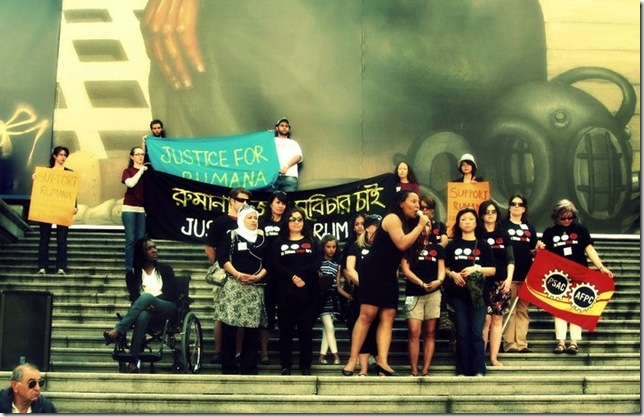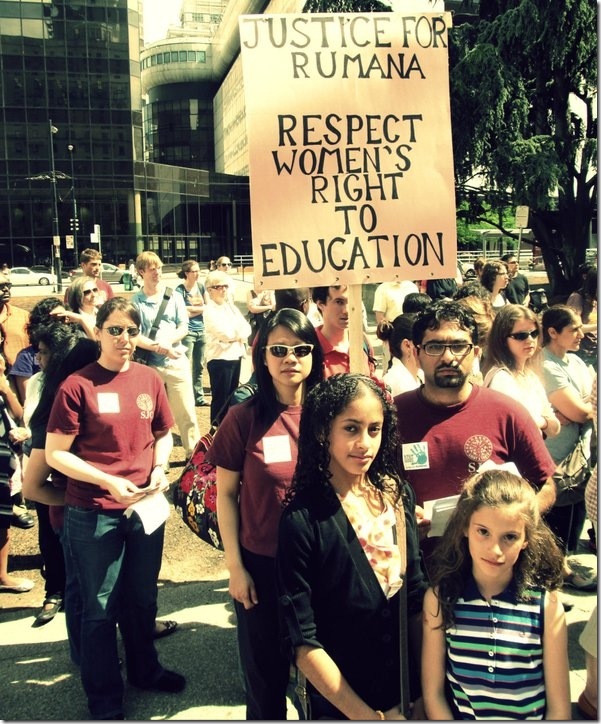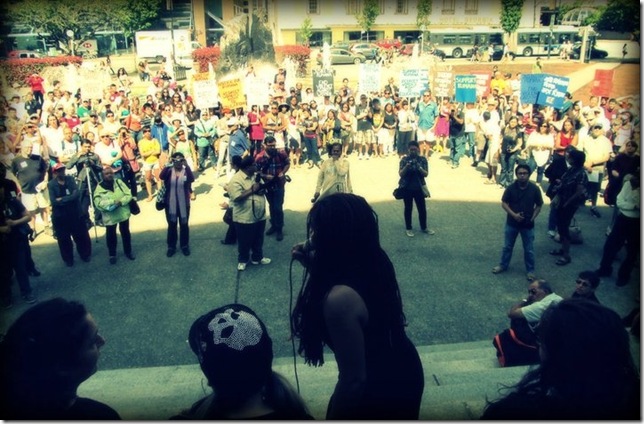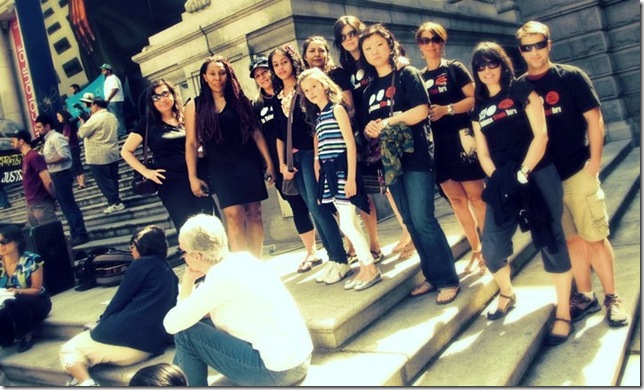For Rumana Monzur
and the Many Other Women Who Have Been (and May Still Be) Living with Intimate Partner Abuse
Written and photographed by Fernanda Selayzin D Souza
Yesterday, I had the honour of joining a group of phenomenal women and men at NO More Violence Against Women rally on the steps of the Vancouver Art Gallery. Organized in support of Rumana Monzur, a graduate political-science student at the University of British Columbia who was brutally attacked earlier this month. Those in attendance gathered from different organizations ranging from the residential college in which Ms. Monzur lived on campus to anti-violence feminist agencies such as Battered Women’s Support Services and the speakers included:
Mohsen Seddigh, UBC student and rally organizer, Stephen Toope, UBC President, Peter Dauvergne, Professor of Political Science at UBC, Dr. Olav Slaymaker, Acting Principal, St John’s College, Sotonye Godwin Hart, UBC law student and Rumana’s friend, Anika Mahmud, Secretary, Bangladeshi Students’ Association, Indira Prahst, Chair, Department of Sociology and Anthropology at Langara College, and human rights activist, Sarah Mah, Collective Member of Vancouver Rape Relief and Women’s Shelter and Angela Marie MacDougall, Executive Director, Battered Women’s Support Services.
A cursory search on the Internet will yield hundreds of articles from the mainstream and alternative media describing the gruesome details of the violence Ms. Monzur suffered and of the alleged circumstance of her cruel attack. From what is known, Ms. Monzur was attacked in her home country of Bangladesh during a visit to her family. According to editorials such as this weekend’s from the Globe and Mail the attacker had the intention of strategically marking Ms. Monzur’s face with the deep scars of shame and vengeance: it was meant to disfigure, to hurt profoundly, for as long as she lives.
Among the range of scholars and activists invited to the microphone to speak yesterday was Angela Marie MacDougall who touched upon at least three points that kept me (and as I imagine many others present at the event) thinking intensely for the rest of the afternoon. First, she called attention to the very possible fact that the life of every single person present at that rally had been touched by violence against women in some way; everyone present there, personally, knew a woman who had been victimized by a situation of intimate partner abuse. While the case at hand constituted a horrific example of grotesque violence which is likely to leave the most indelible scars and physical consequences, for many women, such as the women who access Battered Women’s Support Services, the insidious and often ritualistic type of abuse that happens in private may go unseen but is real enough to result in trauma and affect the victims’ emotional, mental, and physical health. It must not be ignored. Ms. MacDougall emphasized that each person in attendance at the rally has a responsibility to continue to take action to address violence against women into the future days.
Second, she called attention to the fact that whereas women who are submitted to the different brands of intimate partner abuse (emotional abuse, isolation, threats, physical, sexual violence) women will often not leave their abusers or take them back – a fact that is often difficult for those who truly care about a woman’s well being to fathom let alone accept and truly understand – they often do so because of love. Even though, as Marti Loring, warned that survivors of intimate partner abuse “must dis-attach from the lifelong dream of establishing a warm and consistently empathic relation with the abuser,” it is often the case that the hope for actualizing a mutually constitutive relationship of care, respect, cooperation, and support will trump what outsiders are quick to judge as having “the commonsense to leave”. And of course, there are many other reasons why women who are submitted to intimate partner violence and/or abuse do not leave, such as for fearing not having the means to support themselves and their children, as well as fear in general, where statistically women are six times more at risk of being murdered after leaving an abusive relationship than staying. After 10 years of marriage, apparently in Ms. Monzur’s case this ultimate attack was only the most horrifically vicious one of many preceding it.
And third, Ms. MacDougall highlighted the fact that it seemed obvious that on this particularly sunny Sunday afternoon many men (as opposed to the regularly present women) had decided to join in the support for Rumana Monzur despite the many other activities they could have engaged in instead. Even though their presence did not necessarily branded them as feminists, those men who chose to be present were taking action in the interest of women – the overwhelming majority of sufferers of intimate partner abuse – and on behalf of all groups that are affected by violence, including themselves and their children (or future children). While these men did not seem to be there attempting to participate as “protectors of women” – which instead of helping would only serve to perpetuate the gender stereotypes that are an integral part of the problem – these were men who seemed willing to hold themselves and other men personally and institutionally accountable for gender-based power abuse. MacDougall urged them to take action into the days to follow.
Angela Marie MacDougall and the many other speakers who took the time to lend their wisdom and insights during this event touched upon many other important points that must become increasingly part of everyone’s routine conversations (enough about the weather, really). And if I were to humbly re-emphasize one would be to continuously urge anyone who is following the extreme case such as Rumana Monzur’s or any other related to violence and abuse against women and girls, to resist the temptation to think that these are situations that occur outside of the highly industrialized (or post-industrialized) world of the North and the West and actually look deeper to realize that unfortunately, as long as women are perceived to belong to social positions that are subordinate to men’s (as they still very much are right here in Vancouver, Canada) circumstances of abuse and violence are not going to stop. Much like Ms. MacDougall, I too speak from personal experience.








